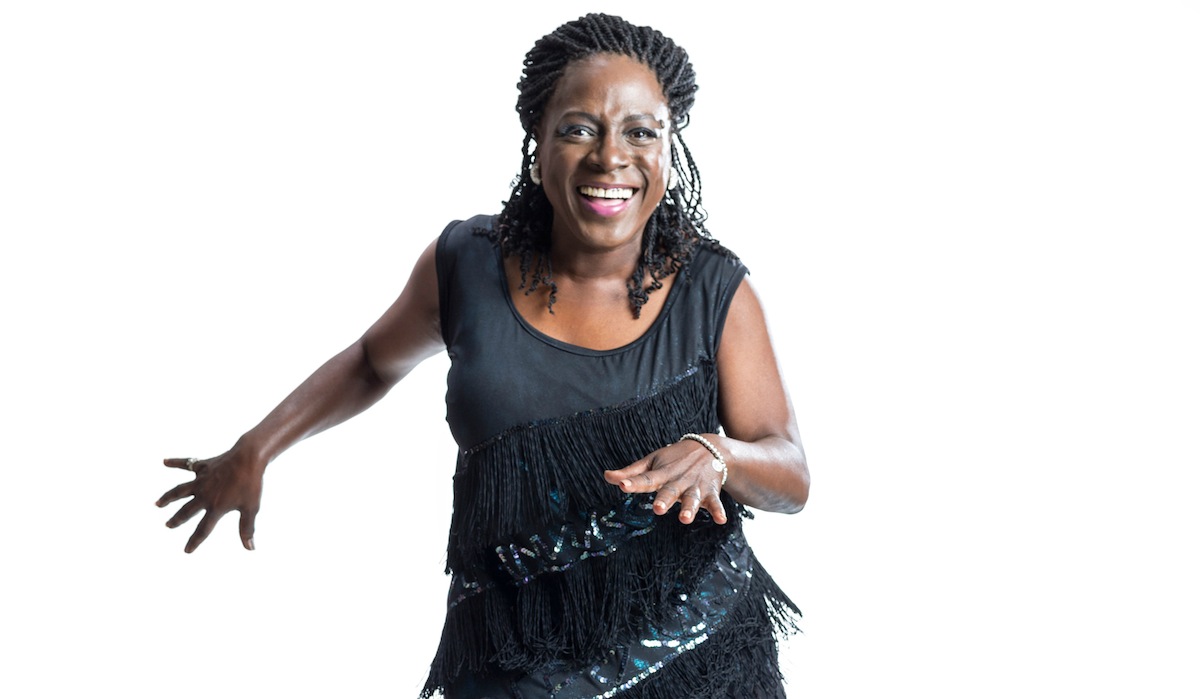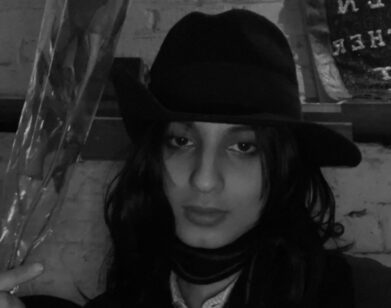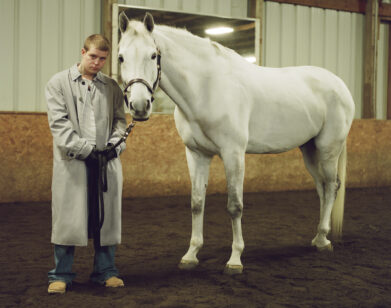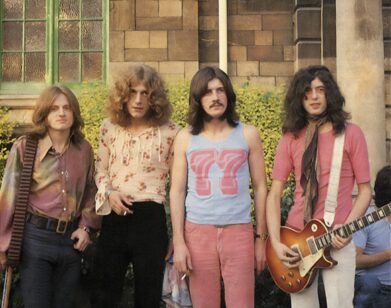Sharon Jones Has Faith in Soul

ABOVE: SHARON JONES. IMAGE COURTESY OF MOTORMOUTH MEDIA
Sharon Jones thought she would never meet Santa Claus. Growing up in North Augusta, South Carolina, then relocating with her mother to a chimney-less apartment building in Brooklyn, she wondered how the holiday icon entered her home to deliver gifts. For one reason or another, she would miss the moment each Christmas when presents were placed under her tree.
At the 2013 Macy’s Thanksgiving Day Parade, Jones finally saw Santa—or at least, a well-dressed imposter. Atop a float resembling Central Park’s Gothic Bridge, she waved at fans and moved her feet with all the energy she could muster. This marked her first public performance since June, when doctors diagnosed her with Stage 2 pancreatic cancer. Though chemotherapy took her trademark braids, she donned matching red mittens, boots, and a fedora.
Now with the chemo sessions done and the cancer in remission, Jones is back with the Dap-Kings, the soul-funk revival band she founded in 1996. The band’s latest album, Give the People What They Want, will be released tomorrow, January 14. Starting with a February 6 show at New York’s Beacon Theater, the band will tour the United States and Europe until the summer.
Jones’ band anchors an experiment in the recording industry. The Dap-Kings were the first—and remain the flagship—act of Daptone Records, a Brooklyn-based independent label Gabe Roth and Neal Sugarman launched 13 years ago, hoping to rejuvenate sounds of soul music’s past. The company roster now includes Antibalas, Sugarman 3, Charles Bradley, and the Menahan Street Band.
We spoke to Jones one afternoon in mid-December, after one of her final chemotherapy sessions. (She expected a sleepless night after her steroid took effect that evening.) Jones sat up on her bed and turned on The Ellen DeGeneres Show. When she and her band perform on the show January 15, she hopes to dance with DeGeneres, as is custom on the program. She wants to sit on her couch and laugh with her, too.
HARRISON GOLDEN: This new album release must feel so surreal to you.
SHARON JONES: To be honest, I didn’t think I would be here for this album. I thought I was going to die. When the doctor came in by himself and told me I had cancer, it was frightening. He told me he got it and there would be six months of chemo. I really thought people would be promoting my record without me here to enjoy it. But I’m here. I’m coming back to give the people what they want.
GOLDEN: What a perfect time to discuss the album name. Did you and your band choose it before or after your diagnosis?
JONES: We chose it a while ago, long before the cancer. But I can’t think of a more fitting title.
GOLDEN: I’m sure it feels great to release this, finally, given your recent hardships.
JONES: This album has almost been in the making for almost three years now. When we first began on it, my mother was sick. When she passed away, I got on stage and played that night. The music helped take me away. When I got sick this past summer, I couldn’t—my mind just wasn’t on music. The rest of the band understood. But once October came, I felt ready to get back again.
GOLDEN: What lifestyle changes have you made personally since the summer?
JONES: The way I look at food and drink. I know for one thing that alcohol will have no more part in my life. Doctors removed my gallbladder and pancreas, which are supposed to break down sugar and alcohol. Another big thing is those vegetables. Juicing has helped me bring my pressure down. Organic natural foods, too. As for meat, I’m not going to become vegetarian. I’m telling you that right now. I want me a steak. I want me a pork chop. I want me a lamb chop, even a piece of duck every once in awhile. We used to have ham and salami, all that crazy stuff. I can’t eat processed food. I’ve got to find local farmers and get natural foods.
GOLDEN: Will your performances change at all?
JONES: I’m going to dress a little different. Those frilly dresses I used to wear on stage, that was the old me. And no wig. I miss my hair, but I feel like going out there with some fake braids wouldn’t be right. I want to be the most genuine performer I can be.
Maybe I won’t have as much energy. And maybe the highs in my voice won’t be what they used to be. But exercise is helping me pace myself. Being with the Dap-Kings is like being an athlete. I’ve got these five-pound weights and a treadmill in the living room. I work out the other parts that have affected my voice: my diaphragm—doctors took mine out in surgery—and my lungs. I’ve got to build back my legs, too, so I can run across that stage. I’ve got a lot to do, but I’m going to get out, sing songs and tell the stories.
GOLDEN: Who has gotten you through your fight?
JONES: My friend Megan Holken is a nutritionist. I have spent some time at her home upstate in Sharon Springs, where she told me how to eat right and cook right. I’m blessed to be in an environment where people are sincere. My fans have written me such kind emails. My management at Daptone helped me heal, too. I’m in a good place.
GOLDEN: There’s such a community behind Daptone Records. What role does that play in the music you and the Dap-Kings make?
JONES: I often call Daptone the Motown and Stax of today. But in some ways it’s different. At Motown, a lot of the musicians didn’t get recognized, music got stolen, and people didn’t get paid. Or the label would just throw them a pinch of money for their songs. That is one thing we’re not doing. Anything anyone writes here, we get a percentage. As for me, I rarely write a song. But when I do write a song, like “Ain’t No Chimneys in the Projects,” which came to me at three a.m. one morning, on a whim—I get a percentage.
GOLDEN: Is it safe to say you consider yourself more of a performer than a songwriter?
JONES: Some people can sit down and write a song, but they can’t go on stage like I can. I tell the songwriter’s story. When I read people’s lyrics, I’m so amazed. I want to tell this story and make it part of my life. I usually can’t write lyrics down, but I can sure tell that story. You’ve got to make people feel the hurt and love in each song.
GOLDEN: Going back to the Motown and Stax comparisons, all the recording materials your band uses are from the 1960s and ’70s, right?
JONES: We use the same tapes, and that is our sound. Even instruments, as close [as possible] to the old amps and guitars in the studio setup. When I start telling people that, they go, “Oh, man! Oh, man!” It’s cool.
GOLDEN: The album artwork has such a feel, too.
JONES: Record designers marvel on that stuff. They go back and look at old covers, then make new ones. Sometimes people look at our covers and say, “That looks just like that other cover.” I say, “And?” It reminds them of a cover from way back when. If you know the cover, then pull it out and compare it. I don’t care. It’s supposed to bring back memories.
GOLDEN: I take it you grew up on a lot of ’60s soul. What drives you to that music?
JONES: Youth. The fact that, in the mid-’90s, guys like Lee Fields gave me and all these young people the chance to do backup. I was in my 30s, but some of those guys were still teenagers. Others were 22 and 23—babies, all of them.
I remember going into a raggedy studio, still with my work uniform on. At the time, I was driving money trucks for Wells Fargo, so I had my gun and hat, which weighed me down in the heat. It was 97 degrees here in New York, and they had to turn the air conditioner off because it was too loud. So, I say, “Damn, it’s hot in here!” That’s how we came up with the song, “Damn, It’s Hot.” It was from our soul. We just got together, sang and made our own lyrics.
GOLDEN: And you worked as a guard at Rikers Island, right?
JONES: From 1988 to 1990.
GOLDEN: I’m getting this image of you singing on the job.
JONES: I would tell some inmates that I was a singer. One night near the cells, I told them I knew Whitney Houston’s “The Greatest Love of All.” The inmates told me they weren’t going into their cells unless I sing. “You’re joking, right?” I asked. They said, “Nope.” I did the verse and the chorus. They said, “Thank you, Miss Jones,” then got back in their cells.
GOLDEN: Was there a particular moment you discovered you could sing?
JONES: I remember my sister and I—my big sister would get up on her chair in the kitchen and sing Mary Wells’ “What’s Easy for Two Is So Hard for One.” It was 1966, and I was 10 years old. Motown was on the radio. It was so much fun as a little girl. Since then, I’ve always sung, either with wedding bands or with neighborhood bands. Always with the church choir. I never stopped singing since those days.
GOLDEN: December 31 is your final day of chemo. How excited are you to finish?
JONES: So glad. I’m ready to face 2014 as strong as ever. And I really can’t wait to dance with Ellen DeGeneres!
GOLDEN: What else would you like to do in the coming years?
JONES: I’m not planning on singing too late. Maybe another eight or 10 years is enough before I retire. It would also be great to revisit all these stunning places around the world where I have toured. When I’m on tour, I don’t see these spots as much as I’d like. I’m just in, I perform, then I’m out. I hope to spend years sightseeing, then more years after that.
SHARON JONES AND THE DAP-KINGS’ GIVE THE PEOPLE WHAT THEY WANT IS OUT TOMORROW, JANUARY 14. FOR MORE ON THE BAND, PLEASE VISIT ITS WEBSITE.






